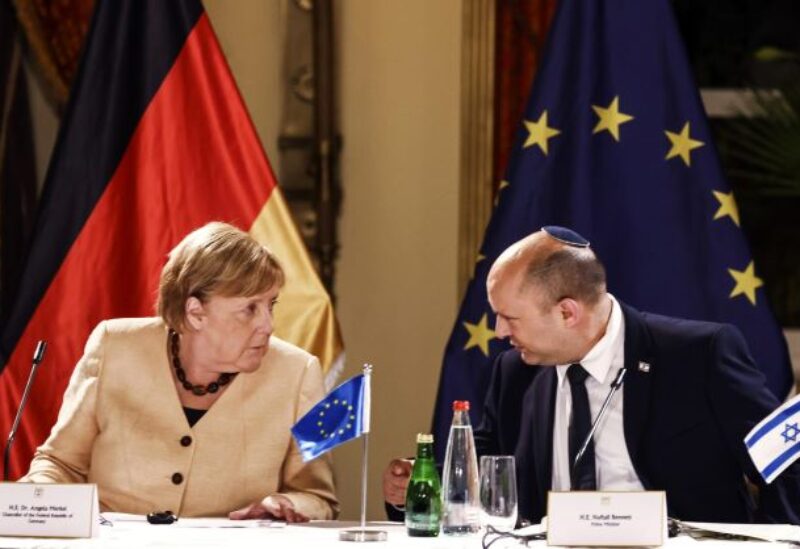
As she concluded off a two-day farewell visit to Israel, German Chancellor Angela Merkel urged Israel not to “lost sight” of the necessity for a Palestinian state.
Merkel’s support for a two-state solution was one of the major points of contention with Israel’s leadership during her 16 years in power, which were marked by unflinching support for the Jewish state.
Merkel praised the historic diplomatic agreements achieved last year between Israel and four Arab countries, led by the United Arab Emirates, in a speech to an Israeli think group. She added, however, that the agreements, known as the Abraham Accords, did not negate Israel’s desire to seek a peace agreement with the Palestinians.
“We must not lose sight of the Palestinians’ right to a chance at life,” she stated. “As a result, even as it gets more difficult as a result of the settlements, one should never lose sight of the problem of a two-state solution,” Merkel told a panel at Tel Aviv’s Institute for National Security Studies.
The Abraham Accords, which were arranged by the Trump administration, have been lauded by supporters as shattering the long-held assumption that Israel could not build ties with the Arab world until it reached a solution with the Palestinians.
Israel’s new Prime Minister, Naftali Bennett, a hard-liner who opposes a Palestinian state on Israeli-occupied lands, has ruled out peace talks with the Palestinians. Instead, he has advocated what he says is a more pragmatic approach of improving living conditions for the Palestinians as a way of lowering tensions. His government, a patchwork of dovish, nationalist and Arab parties that took office in June, so far has not announced any major changes in policy.
Merkel welcomed Bennett’s intentions but said such an approach would not be enough.
“I think that such a long-running issue (the conflict with the Palestinians) will not disappear from the agenda, even if there are improved relations with neighboring Arab states,” she said.
Throughout Merkel’s visit, she was welcomed as a “true friend” of Israel. Her agenda included meetings with Israeli leaders and a stop at Israel’s national Holocaust memorial, Yad Vashem.
She repeatedly professed Germany’s commitment to Israel’s security and said she was confident that her country’s next government — to be determined in lengthy coalition talks following an inconclusive election last month — would take a similar stance.
A key issue on the agenda was Iran’s nuclear program. Germany was one of the world powers that negotiated the 2015 international nuclear deal with Iran.
The deal fell apart after then-President Donald Trump, with Israel’s support, withdrew in 2018. The Biden administration has been trying to revive that deal over Israeli objections.
Israel considers Iran its greatest enemy, citing the country’s military presence in neighboring Syria and its support for hostile militant groups across the region. It accuses Iran of trying to develop nuclear weapons — a charge Iran denies — and believes that international deal did not contain sufficient safeguards.
In the meantime, Iran has marched forward with its nuclear activities, such as increased uranium enrichment — a step that can move it closer to building a bomb.
Merkel said that disagreements among the world powers that negotiated the original deal have weakened their position and allowed Iran to buy time and expand its military activities across the region.
“Iran knows this, and therefore we face a very serious situation,” she said. She acknowledged that she does not have a solution, but called on key players, including Russia and China, to take a stronger public stance against Iran.
“The more countries make it clear that they don’t accept the ambitions and aggression of Iran, the better for the region,” she said.
Israel was formed in the wake of the Holocaust in 1948 and the two countries only established diplomatic ties in 1965. But over the decades, those ties have warmed and Germany is one of Israel’s closest and most important international allies and trade partners.
Merkel was scheduled to visit in August, but the trip was postponed after the crisis in Afghanistan in which the Taliban seized power. She then delayed the visit until after last month’s German election. She now remains in office in a caretaker capacity until a new government is formed, a process that could take weeks or even months.